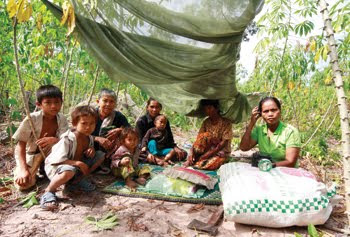(Posted by CAAI News Media)
Thursday, 26 November 2009 15:03 Robbie Corey Boulet
TUOL Sleng prison chief Kaing Guek Eav, alias Duch, reiterated his remorse for Khmer Rouge-era crimes Wednesday, but not before using the bulk of his closing statement to downplay the torture facility’s significance and paint himself as an unwilling “cog in a running machine” over which he had no control.
Prosecutors, meanwhile, asked judges to hand down a 40-year prison sentence in the Khmer Rouge tribunal’s first case, dismissing as baseless Duch’s claim that he acted under duress.
“I am psychologically accountable to the entire Cambodian population for the souls of those who perished” during the regime, Duch said. “I am deeply remorseful and profoundly affected by destruction on such a mind-boggling scale.”
Addressing the court after the prosecution, which argued that his crimes stemmed from a sustained embrace of Pol Pot’s hardline ideology, Duch instead characterised his involvement with the regime as a naive mistake that could not be undone.
“I clearly understand that any theory or ideology which mentions love for the people in a class-based concept and class struggle is definitely driving us into endless tragedy and misery,” he said. “I still maintain that a decision to choose which path to walk is made in a matter of seconds.
However, its repercussions, if it is a wrong choice, will result in lifelong remorse.”
Duch emphasised that he had “fully and sincerely cooperated with the court any time the court has needed me” since his arrest in 1999, a point he asked judges to consider as they prepare to issue a verdict early next year.
Prior to his apology, Duch offered a dense overview of the regime’s history and operations, highlighting points at which he was made “terrified” of its policies but felt compelled to implement them anyway.
While working at M-13, the prison in Kampong Speu province Duch headed before the regime came to power, and where prosecutors accused him of developing the torture techniques that would later be used at Tuol Sleng, Duch said he could not comprehend the executions of local villagers who had been deemed enemies by his fellow cadres.
“I was completely terrified at this destruction, but I just did not know what I could do about it,” he said. “The only opinion available to me was to devise a proper interrogation tactic.”
Photo by: AFP/ECCC POOL
Former Khmer Rouge prison chief Kaing Guek Eav, alias Duch, prepares to deliver his closing statement at the ECCC on Wednesday.
Later, he recalled the killings of cadres in the Northern Zone that resulted from the interrogation of its secretary, Koy Thuon, in 1977.
“The purge of Koy Thuon’s network terrified me again for the second time. This time it was most shocking. I wondered why the north peasants had to die,” he said.
Duch also sought to downplay Tuol Sleng’s importance in relation to the other santebal, or secret police, offices, saying, “All santebal offices were equal before the party.”
There were at least 196 security centres, and each “was under the clear supervision of the party”, which had the sole authority to decide who would be arrested and executed, he said.
The relative importance of Tuol Sleng was also addressed by defence lawyer Kar Savuth, who wondered aloud why the chairmen of other prisons were “living free”.
“Each prison used the same torture, the same murder, under the same order from Angkar,” Kar Savuth said.
“Why are those chairmen free? It’s only Duch, by himself, who killed very few people. He is brought for trial to get the situation of a scapegoat.”
This dovetailed with testimony provided in September by Raoul Marc Jennar, a Belgian academic who appeared at the request of Duch’s defence team, telling the court that there were nine Khmer Rouge security centres that claimed more victims than Tuol Sleng, and that some of their directors were “living peacefully”.
Duch said executions at all of the security centres were ordered exclusively by party leaders.
“The santebal office had no right to smash,” he said. “To put it simply, the chief of the santebal office, whoever it was, had no authority to issue any subjective order to arrest anyone.”
He acknowledged, though, that Tuol Sleng “was unique” in some ways, noting that high-level cadres from across the country were sent there, a practice he blamed on Pol Pot.
“Pol Pot regarded these people as the thorns in his eyes which had to be monitored, observed, and measures had to be taken,” he said.
The influence of Pol Pot on Khmer Rouge crimes was a recurring theme Wednesday, with Kar Savuth repeatedly placing the regime leader at the top of a small hierarchy of cadres who he said were vested with decision-making authority – a hierarchy that excluded Duch.
The accused himself also made repeated references to Pol Pot’s role in the regime, saying, “I already made it clear before the chamber that Pol Pot was a criminal person. Pol Pot really wanted to become a king.”
At the end of his statement, Duch again asked to share in the sorrow caused by crimes committed at S-21. That request, first uttered during his confession and apology in March, has irritated some civil parties throughout the trial.
“I plead with you to allow me to share your immense and enduring sorrow anytime in order to express my most excruciating remorse,” Duch said.






























